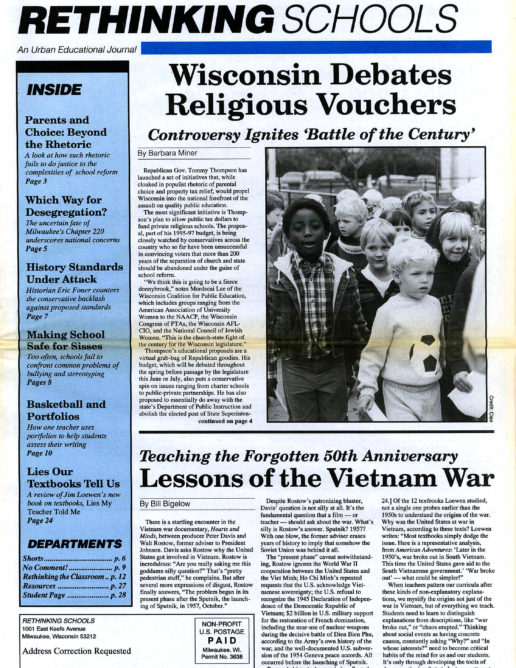Why Not Teach About Harriet Tubman?
Conservatives Attack History Standards
Rarely has the study and teaching of American history been the subject of such intense public scrutiny as it is today. In the past few months, the flying of the Confederate flag has inspired marches and countermarches; a proposed exhibition at the National Air and Space Museum to mark the 50th anniversary of the dropping of the first atomic bomb has been substantially revised to meet the objections of veteran’s groups; and Disney dropped plans to build an American theme park near the famous Manassas Civil War battlefields, which critics said would detract from the true historic site only a few miles away. Now, heated controversy has erupted over proposed national standards for history education, developed by UCLA’s National Center for History in the Schools.
The standards debate will have the most enduring impact on how Americans think about their past. Lynn Cheney, former head of the National Endowment for the Humanities, has condemned the new guidelines, charging that they neglect great figures such as George Washington, while favoring racial minorities such as Harriet Tubman, who led escaping slaves to freedom before the Civil War.
Given that curriculum standards are a series of historical themes and concepts students need to master, it is absurd to judge them solely on the basis of how many individuals are mentioned. Individuals are mostly introduced to illustrate the concepts at the heart of the guidelines. Topics mandated under the new standards, for example, include teaching the military strategy of the War for Independence, which would inevitably require pupils to study George Washington.
The standards debate shows every sign of becoming one of those battles in the “culture wars” marked more by vituperation and oversimplification than illumination. Cheney’s criticisms, originally published in an op-ed in the WallStreetJournal, elicited a flurry of overheated denunciations of the standards. One letter writer in the Journallikened them to distortions of history “developed in the councils of the Bolshevik and Nazi parties.” Others have charged that “tenured radicals,” bent on destroying respect for America’s institutions, hijacked the process for developing standards.
In fact, the American history standards were drawn up with the participation of literally hundreds of high school and university teachers, and with input from staid professional organizations such as the National Council for the Social Studies and the American Association for State and Local History. To believe that these and other groups united for the purpose of undermining faith in American society is to indulge in a conspiratorial mode of thought — itself a recurrent theme in the American past.
A Step Forward
The standards are by no means perfect; documents produced by committee rarely are. I, myself, would have preferred more emphasis on labor and class relations — a common omission in multiculturalist works of history. But in a country where few students possess a significant store of accurate knowledge about the past, the standards represent an enormous step forward. They reflect the remarkable expansion during the past generation of our definition of American history, the new attention to the experience of African Americans, women, and other groups neglected in previous narratives. This does not mean that the achievements of “white men” are ignored, but that we now possess a more comprehensive, nuanced, and believable portrait of the American past.
Unfortunately, the media have reinforced the erroneous impression that the new standards pander to the prejudices of minorities. A recent report on the “CBS Evening News” spent much of its time interviewing Black students and teachers who welcomed the new guidelines because they found it impossible to identify with white figures such as the founding fathers. Black pressure, the report suggested, had resulted in replacing one set of biases with another.
CBS implicitly accepted an assumption that, oddly enough, is shared by the Black students who support the standards and the conservative critics who have denounced them — that the purpose of studying history is to foster individual and group pride. Thus, we teach about Tubman to provide Black students with a role model, or Washington and Madison to make Americans proud of their nation’s accomplishments.
Black pupils certainly need to learn about George Washington, but why shouldn’t white students study the life of Harriet Tubman? Somehow, in the view of the critics, Washington belongs to all of us, while Tubman is relevant only to Blacks.
Historians today emphasize the Black experience, as well as that of other previously neglected groups, not to assuage resentments over past exclusion or to “get even,” as the CBS reporter declared, but because these are integral parts of the American past. Slavery, for example, was neither an aberration in the story of America’s quest for freedom, as it used to be portrayed in texts, nor an institution that affected Blacks alone. It is emphasized in the standards not to undermine pride in our heritage, but because of its importance to the nation’s economic, social, and political development.
Defining the issue as whether white men or minorities get more attention obscures a point missed in nearly all press accounts of the standards debate. There is nothing unusual or pernicious in revising accounts of the past — historians have been doing that since the days of Thucydides. The motive is not to make certain groups feel better, but the never-ending quest for historical understanding.

